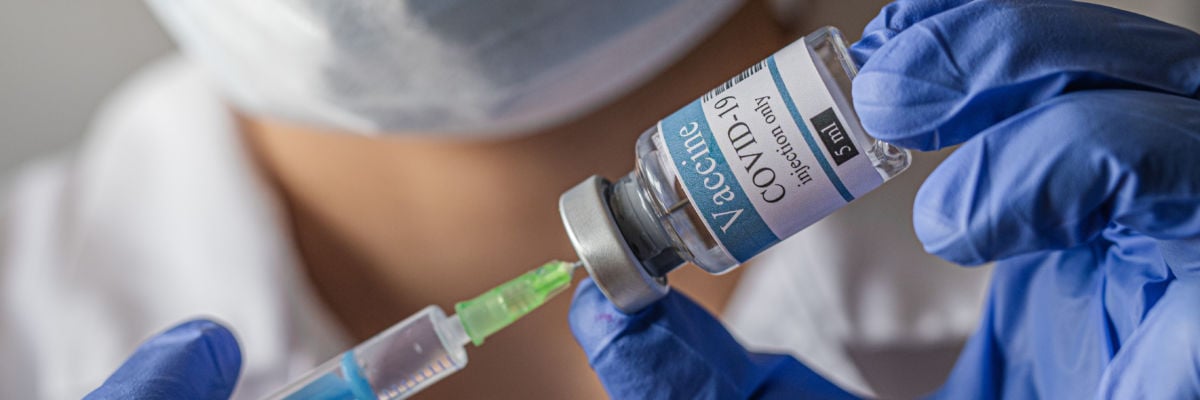
Many pro-life Catholics face a dilemma of conscience over the use of vaccines whose viral agents are grown on a culture of fetal cells derived from abortions. This dilemma has become increasingly apparent in light of recent statements by the Italian and the English bishops in the face of the Covid-19 pandemic. These statements, while repeating the common Church teaching on moral cooperation in evil, appear to foreclose the possibility of refusing to use all such vaccines as an act of conscientious objection.
Many Catholics who have fought the culture of death were profoundly disappointed. Once again, it seems, their bishops lack understanding of “the facts on the ground” and are ignoring the degree to which the previous counseled measures of justified use combined with protest have utterly failed to stop the slide into the bioethical abyss. Language that correctly states that individuals may use such vaccines turns to exceptionless and unnuanced language in condemning the failure to do so in the case of serious diseases.[1]
We will therefore look first at the permissibility of using such vaccines and the conditions the Church attaches to their use, then the issue of conscientious objection.
The Church teaches that for serious reasons, it is morally permissible to use a vaccine whose active agent was grown on a culture of human fetal cells derived from abortion, provided that, 1) there is no moral complicity in the gravely evil act that gave rise to the cells (abortion), and 2) the user makes an act whose purpose is to prevent the scandal of conveying approval of the abortions from which the cells came.[2] [3]
The first condition is already satisfied in the case of current vaccines by the causal remoteness of the abortion from the vaccine, making their use remote material cooperation. The second condition is satisfied by some form of conscientious objection. The most common way is to protest to doctors, pharmaceutical companies, politicians, and when necessary family and friends, so that no one wrongly gets the idea that the user approves of abortion. For some, this protest has taken the form of refusal to use some or all such vaccines.
The 2005 statement of the Pontifical Academy for Life (PAL) addresses the issue of moral cooperation and conscientious objection in depth. It notes that there is a grave responsibility to use an alternative, ethical vaccines if available. If this is not possible, we must protest the available unethical ones, whether we choose to use them or not. In his encyclical, Gospel of Life, Pope St. John Paul II enunciates the principle:
Doctors and fathers of families have a duty to take recourse to alternative vaccines (if they exist), putting pressure on the political authorities and health systems so that other vaccines without moral problems become available. They should take recourse, if necessary, to the use of conscientious objection (73).
However, it then seems to take away the possibility of anything other than protest. Speaking specifically of the Rubella vaccine, the document adds, in more temperate language:
However, the burden of this important battle cannot and must not fall on innocent children and on the health situation of the population—especially with regard to pregnant women.
Here we see a distinction between conscientious objection by protest and conscientious objection by refusal. The first is encouraged, the latter is discouraged—at least in the case of vaccines for diseases considered deadly, such as Rubella.
But does this truly foreclose the possibility of conscientious objection by refusal, which many pro-life Catholics, clergy, and laity believe necessary to resist the culture of death? This is the essence of the moral dilemma that many Catholics have if these magisterial documents are to be taken at face value. On the one hand, all Christians have positive obligations of charity and solidarity with others, especially those at greatest risk of serious disease, as the documents rightly insist. On the other hand, there is for many Catholics, and other Christians, a personal impossibility of using such vaccines as a matter of conscience. Can the two realities be reconciled?
I believe they can. Another aspect of Church moral doctrine is the principle of impossibility, which is often, though not exclusively, relevant to medical moral questions. Simply put, the obligation to obey a positive law or to do a positive good cannot always be fulfilled. We take this for granted, for instance, when we can’t get to Sunday Mass due to weather or sickness, or when we don’t give fraternal correction on a particular occasion to avoid provoking a fight.
This impossibility can be physical or moral; it can be due to a lack of time or financial or other resources, difficulty of doing, pain involved, or risk. It must be based on prudence (practical reason), which requires that we gather the relevant facts and advice, take spiritual counsel, and then make a conscientious and prayerful decision.
In addition to physical impossibility, the Church also recognizes that there can be a moral impossibility for an individual to do a particular act. Medieval moralists called it a vehemens horror. In the case of vaccines associated with abortions, even remote ones, the horror is to have any association with the taking of innocent life. The conscience calls for conscientious objection, not just by protest, but by refusal. The purpose of the conscientious objection is not that it be universally practiced, to the detriment of the safety of a society, but that its use by some individuals reinforces the dignity of human life in the face of increasing indifference to it. Similarly, there can be a moral impossibility for a person to use a vaccine owing to concerns about safety, even subjective ones.
Finally, conscientious objection by refusal could be judged by some to be the most effective way of demonstrating justice, charity, and solidarity with the most vulnerable––past, present, and future. Our society should accept and tolerate such objections, as it has generally done for conscientious objection in other areas. Given that nothing has been effective in stopping the slide along the path of bioethical self-destruction, the role of conscientious objection deserves greater consideration, particularly by theologians and the Magisterium.
[1] 2005 Pontifical Academy of Life, Moral Reflections on Vaccines Prepared From Cells Derived from Aborted Human Fetuses, fn. 15: “The parents who (do) not accept the vaccination of their own children become responsible for the malformations in question, and for the subsequent abortion of fetuses, when they have been discovered to be malformed.”
[2] “The corpses of human embryos and fetuses, whether they have been deliberately aborted or not, must be respected just as the remains of other human beings. . . . Furthermore, the moral requirements must be safeguarded that there be no complicity in deliberate abortion and that the risk of scandal be avoided. . . . as for the corpses of adult persons, all commercial trafficking must be considered illicit and should be prohibited (Donum Vitae 4).
[3] Dignitas Personae 34-35, 37.



